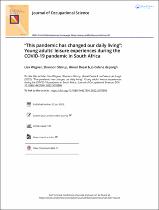“This pandemic has changed our daily living”: Young adults’ leisure experiences during the COVID-19 pandemic in South Africa
Date
2022Author
Wegner, Lisa
Stirrup, Shannon
Desai, Himali
De Jongh, Jo-Celene
Metadata
Show full item recordAbstract
The COVID-19 pandemic is a global human ecosystem disruption affecting almost every facet of daily living. South Africa adopted a risk-adjusted approach comprising five-levels to curb the spread of COVID-19. Early in 2020, the country experienced level 5 and 4 restrictions, indicating high COVID-19 spread with low to moderate health system readiness. South Africans were largely confined to their homes. This study explored young adults’ experiences of leisure engagement during the confinement, adaptations made, and the influence on health and wellbeing. Thirteen occupational therapy student researchers conducted individual qualitative, exploratory-descriptive studies on young adults’ leisure experiences during the level 5 and 4 confinements. The authors used a qualitative meta-analytic approach to review the student researchers’ primary studies and synthesize findings for this paper. The sample comprised 65 participants aged 18 to 32 years (mean age 22.2 years), the majority being either students or employed. Participants were interviewed online or submitted written responses to open-ended questions focusing on their leisure engagement during the confinement. Relevant data were extracted from the primary studies and analyzed thematically. Four themes emerged: 1) disruption, 2) time, 3) adaptations to change, and 4) leisure benefits. Although participants experienced the confinement as disruptive, and restricting their leisure and social engagement, they adapted and developed new leisure occupations, which had a positive influence on their health and wellbeing. In conclusion, the young adults dealt with the occupational injustices of confinement by adapting their leisure engagement, thus displaying occupational resilience, which positively influenced health and well-being.

